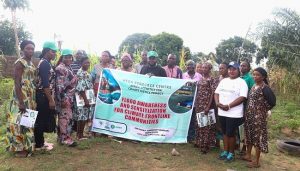As flooding continues to threaten communities across Nigeria, HEDA Resource Centre, a Lagos-based non-governmental organisation (NGO), has intensified its efforts to mitigate the impact on farming communities, particularly in Bauchi and Benue states.

In collaboration with local partners and funded by the Ministry of Foreign Affairs of the Netherlands under the African Activists for Climate Justice Project, HEDA launched a flood sensitisation and awareness campaign across the country to educate and empower small-holder farmers on climate change impacts and flood preparedness.
In Bauchi State, communities such as Walia, Melandige, and Sakuwa in Itas Gadau LGA were visited.
During a sensitisation session, Hajia Aminat Bala Jubril, Director, Association of Small-Scale Agro Producers in Nigeria (ASSAPIN), and a partner with HEDA, addressed farmers on strategies to mitigate flood risks. She highlighted the importance of investing in flood-resistant rice seeds and advised farmers to incorporate these improved seeds into their future budgets to protect their crops.
Hajia Aminat also urged farmers to stay informed through weather updates from NiMet, which has predicted potential flooding in the area between April and October 2024.
Hajia Fatima, a community leader and farmer, spoke on behalf of the local farmers sharing their experiences with flood, and called on governments and corporate organisations to come to their aid by building long-term infrastructure that can withstand the flood, as well as dredging of the river, which had previously reduced the impact flood risks in the region.
Similarly, in Benue State, HEDA engaged with the communities of Agasha, Adaka, Ajaha and Abatse of the Guma and Makurdi local government areas. The campaign focused on early warning systems and flood-resistant farming techniques.
Farmers like Racheal Uzor shared their struggles with flooding, explaining how they had to navigate farming in flood-prone areas, often losing their crops despite flood warnings. She also appealed to the government for clean water access through boreholes, as their water sources have been severely affected by flooding.
Victor Osimo, another farmer in Benue, highlighted the poor drainage systems and the impact of floods on their farmlands. He called for government intervention to address issues like agro-chemical contamination and poor infrastructure, which exacerbate their vulnerability to flood impact.
HEDA’s Executive Secretary, Sulaimon Arigbabu, emphasised the importance of adopting modern, climate-resilient farming techniques to mitigate agricultural losses.
He encouraged farmers to remain vigilant and use climate data to inform their planting decisions. He further explained that the objective behind this campaign is to equip climate frontline communities, especially farmers with the right information and knowledge that will empower them to help themselves and reduce their climate related risks.
Meanwhile, HEDA has visited five other states (Adamawa, Kwara, Niger, Kogi, and Nasarawa) in the ongoing campaigns and in both states aim to equip communities with the knowledge and tools necessary to reduce the impacts of climate-related disasters.
As the October-November flood period approaches, interventions, such as HEDA’s, are crucial for improving the resilience of vulnerable communities across the country, in order to ensure that lives, livelihoods, and food security are better protected.
